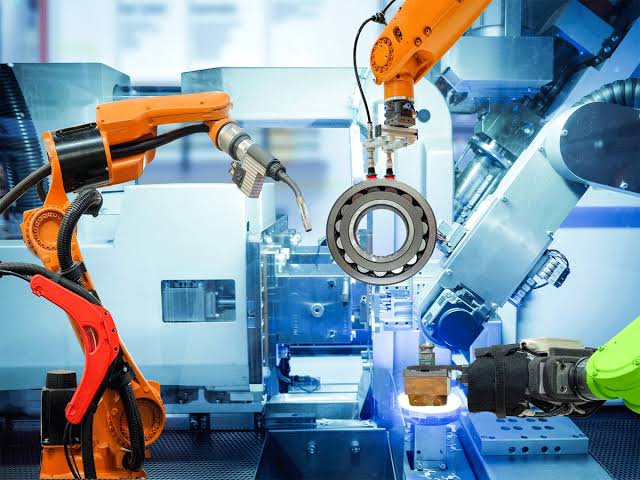Capital goods refer to tangible assets such as machinery, equipment, factories, and infrastructure that are used in the production of other goods and services. Unlike consumer goods, which are intended for direct consumption, capital goods are used to facilitate the production process or to provide services over an extended period.
They are essential for businesses to operate and generate income. In the dynamic landscape of modern business, strategic investment decisions play a pivotal role in shaping long-term success. Among these decisions, investing in capital goods stands out as a cornerstone strategy for businesses across industries.
From manufacturing giants to service-oriented enterprises, the benefits of allocating resources to capital goods extend far beyond mere asset acquisition. Investing in capital goods brings forth a myriad of advantages, each contributing to the overall growth and prosperity of businesses.
One such advantage is the enhanced productivity and efficiency that capital goods enable. Advanced machinery and technology streamline production processes, automate tasks, and improve output quality, optimizing resource utilization and minimizing wastage.
This heightened productivity not only translates into cost savings but also empowers organizations to meet growing demands with agility and precision. Furthermore, capital goods investments provide businesses with a competitive advantage in today’s fiercely competitive marketplaces.
State-of-the-art technology and infrastructure enable firms to outperform rivals in terms of quality, speed, and innovation. Whether adopting the latest manufacturing techniques or deploying advanced IT systems, capital investments empower businesses to stay ahead of the curve and seize market opportunities.
Moreover, investing in capital goods lays the foundation for capacity expansion and scalability. As businesses evolve and demand fluctuates, the ability to scale operations becomes paramount. Capital goods investments provide the necessary infrastructure and capacity to accommodate increasing production volumes or market expansion.
Whether through the addition of production lines, expansion of facilities, or deployment of modular equipment, businesses can adapt to changing market dynamics and capitalize on growth opportunities with ease. While the initial outlay for capital goods investment may seem substantial, the long-term cost savings far outweigh the upfront expenses.
Durable, high-quality assets mitigate the need for frequent repairs and replacements, reducing maintenance costs and downtime. Advancements in energy-efficient technologies further lower utility expenses, contributing to sustainable cost savings over time.
Additionally, capital goods investments serve as catalysts for innovation and technological advancement, driving continuous improvement within industries. By embracing cutting-edge technologies and investing in research and development, businesses foster a culture of innovation that propels them towards new frontiers of growth and prosperity.
Diversifying investments across capital goods portfolios also helps businesses mitigate risks associated with market volatility, economic downturns, or regulatory changes. Spreading resources across a spectrum of assets hedges against unforeseen challenges and maintains operational resilience in the face of adversity.
Ultimately, investing in capital goods creates long-term value for stakeholders by driving sustainable growth, profitability, and shareholder returns. Strategic investments enhance operational capabilities, instill confidence among investors, employees, and customers, and uphold commitments to corporate social responsibility.
The Impact and Importance of Capital Goods in The Economy

In the intricate web of economic activities, capital goods play a fundamental role in driving growth, productivity, and innovation. From powering industrial production to enabling infrastructure development, the significance of capital goods reverberates across various sectors, shaping the overall economic landscape.
Capital goods, encompassing machinery, equipment, infrastructure, and technology, serve as the backbone of modern economies. Unlike consumer goods, which satisfy immediate needs and desires, capital goods are utilized in the production process, enabling businesses to manufacture goods and deliver services efficiently and effectively.
As such, capital goods represent investments in future productivity and growth, laying the groundwork for long-term economic prosperity. One of the primary impacts of capital goods on the economy is their role in enhancing productivity and efficiency. By deploying advanced machinery and technology, businesses can automate processes, streamline operations, and optimize resource utilization.
This heightened productivity not only drives down production costs but also enables firms to produce more output with the same level of input, thereby boosting overall economic output and competitiveness. Moreover, capital goods investments foster innovation and technological advancement, driving continuous improvement across industries.
By embracing cutting-edge technologies and investing in research and development, businesses spur technological innovation, leading to the creation of new products, processes, and markets. This cycle of innovation not only fuels economic growth but also enhances the quality of life by improving standards of living, healthcare, and environmental sustainability.
Furthermore, capital goods investments play a crucial role in infrastructure development, laying the foundation for economic expansion and connectivity. Investments in transportation, communication, energy, and other critical infrastructure enable businesses to access markets, suppliers, and customers more efficiently, facilitating trade and economic exchange.
Robust infrastructure also attracts investment, fosters regional development, and enhances the overall resilience and competitiveness of economies. In addition to driving productivity and innovation, capital goods investments contribute to job creation and human capital development. The deployment of advanced machinery and technology creates demand for skilled labor, driving up wages and employment opportunities.
Moreover, investments in education and training programs tailored to capital-intensive industries equip workers with the skills and expertise needed to thrive in a technology-driven economy, thereby enhancing overall productivity and competitiveness. Capital goods investments also have a multiplier effect on economic activity, generating ripple effects throughout the economy.
As businesses invest in new machinery, equipment, and infrastructure, they create demand for goods and services in related industries, such as manufacturing, construction, and logistics. This spurs additional investment, consumption, and employment, creating a virtuous cycle of economic growth and development.
Furthermore, capital goods investments contribute to international competitiveness and global integration. By adopting advanced technology and modernizing production processes, businesses enhance their ability to compete in global markets, attract foreign investment, and participate in global value chains. This not only expands export opportunities but also fosters economic integration and cooperation, driving cross-border trade, investment, and innovation.
Read Also: Digital Marketing: A Step-By-Step Complete Guide
What Are The Companies Involve in Capital Goods Field

In the capital goods field, several companies stand out as key players, driving innovation, productivity, and economic development. These companies span various industries, from manufacturing and construction to technology and energy, and play a crucial role in supplying the machinery, equipment, and infrastructure that underpin economic activity.
1. General Electric (GE): General Electric, a multinational conglomerate headquartered in the United States, is a powerhouse in the capital goods sector. With a diverse portfolio spanning aviation, healthcare, power, renewable energy, and more, GE is a leading provider of advanced technology and equipment. From aircraft engines and medical imaging systems to power generation and renewable energy solutions, GE’s innovations drive efficiency, sustainability, and productivity across industries.
2. Siemens AG: Siemens AG, based in Germany, is another global giant in the capital goods industry. Specializing in electrification, automation, and digitalization, Siemens offers a wide range of products and services, including industrial automation systems, energy-efficient technologies, and smart infrastructure solutions. With a focus on innovation and sustainability, Siemens plays a pivotal role in shaping the future of manufacturing, energy, and infrastructure worldwide.
3. Caterpillar Inc.: Caterpillar Inc., headquartered in the United States, is a leading manufacturer of construction and mining equipment, diesel and natural gas engines, industrial gas turbines, and more. With a presence in over 180 countries, Caterpillar’s products and services enable infrastructure development, mining operations, and construction projects around the globe. As a key player in the capital goods industry, Caterpillar contributes to driving economic growth and development through its innovative solutions.
4. ABB Group: ABB Group, headquartered in Switzerland, is a pioneering technology company specializing in electrification, robotics, automation, and motion. ABB’s products and services span multiple sectors, including utilities, transportation, and manufacturing, and are renowned for their reliability, efficiency, and sustainability. With a focus on digitalization and automation, ABB helps customers optimize operations, improve productivity, and reduce environmental impact.
5. Boeing Company: Boeing Company, based in the United States, is a leading aerospace manufacturer and defense contractor. Specializing in commercial airplanes, military aircraft, satellites, and related services, Boeing plays a crucial role in advancing aviation technology and infrastructure. With a global footprint and a legacy of innovation, Boeing contributes to economic development, job creation, and technological advancement in the aerospace sector and beyond.
6. Schlumberger Limited: Schlumberger Limited, headquartered in the United States, is a world leader in oilfield services and technology. Specializing in exploration, drilling, production, and reservoir characterization, Schlumberger provides a wide range of equipment, software, and services to the oil and gas industry. As a key player in the energy sector, Schlumberger helps maximize resource recovery, optimize production efficiency, and drive innovation in the global energy landscape.
7. Toyota Motor Corporation: Toyota Motor Corporation, based in Japan, is a leading automotive manufacturer renowned for its commitment to quality, innovation, and sustainability. With a diverse product lineup spanning passenger cars, trucks, hybrids, and electric vehicles, Toyota is at the forefront of automotive technology and manufacturing excellence. Through investments in research and development, Toyota continues to push the boundaries of mobility, safety, and environmental stewardship.
8. Samsung Electronics Co., Ltd.: Samsung Electronics Co., Ltd., headquartered in South Korea, is a global leader in consumer electronics, semiconductor technology, and information technology. With a vast portfolio of products, including smartphones, televisions, memory chips, and home appliances, Samsung plays a pivotal role in driving technological innovation and digital transformation worldwide. As a key player in the capital goods sector, Samsung’s products and solutions empower businesses and consumers alike.
9. Deere & Company: Deere & Company, based in the United States, is a prominent manufacturer of agricultural machinery, construction equipment, and forestry machinery. With a legacy dating back to the 19th century, Deere’s iconic green and yellow equipment is synonymous with quality, reliability, and innovation in the farming and construction industries.
10. Hitachi, Ltd.: Hitachi, Ltd., headquartered in Japan, is a diversified conglomerate with operations spanning information technology, electronics, power systems, and more. With a focus on social innovation and sustainability, Hitachi develops advanced technology solutions that address global challenges in areas such as energy, transportation, healthcare, and urban development. As a key player in the capital goods industry, Hitachi’s innovative products and services drive progress and prosperity in societies worldwide.
Read Also: How to Start An Etsy Shop
The Role of Capital Goods in Job Creation and Employment opportunities

Capital goods, comprising machinery, equipment, infrastructure, and technology, are integral to driving economic growth and job creation. They not only stimulate economic activity but also create diverse employment opportunities across various sectors of the economy.
From direct employment in capital goods industries to indirect employment in supply chains and downstream industries, capital goods investments play a pivotal role in fostering innovation, productivity, and sustainable development.
One of the primary ways capital goods contribute to job creation is through direct employment within industries involved in their production, manufacturing, and maintenance. Skilled workers, engineers, technicians, and support staff are essential in designing, assembling, installing, and servicing capital goods.
These jobs span a wide range of functions, including engineering, manufacturing, assembly, quality control, logistics, and customer support. Moreover, the production and distribution of capital goods create ripple effects throughout supply chains, generating additional employment opportunities in related industries.
Suppliers of raw materials, components, and intermediate goods, as well as transportation and logistics providers, contribute to the capital goods ecosystem, supporting manufacturing processes and facilitating the movement of goods.
Additionally, service providers offering maintenance, repair, and technical support for capital goods further expand employment opportunities, creating a network of interconnected industries that drive economic activity and job creation.
Investments in capital goods also stimulate demand in downstream industries that rely on machinery, equipment, and infrastructure to operate and expand their operations. For example, investments in manufacturing machinery and automation technology lead to higher demand for raw materials, components, and ancillary services.
Similarly, investments in infrastructure projects, such as transportation networks, utilities, and telecommunications, create demand for construction materials, equipment, and skilled labor, spurring job creation in the construction sector and related industries.
Capital goods investments drive productivity and efficiency gains across industries, leading to increased demand for skilled workers and specialized roles. By deploying advanced machinery, automation technology, and digital solutions, businesses optimize production processes, reduce costs, and improve quality.
This often necessitates hiring additional workers to operate and maintain equipment, oversee production processes, and implement technology solutions, creating opportunities for employment and skill development. Furthermore, capital goods investments drive innovation and technological advancement, creating opportunities for highly skilled workers in research, development, and engineering roles.
By embracing cutting-edge technologies such as robotics, artificial intelligence, and advanced manufacturing techniques, businesses develop innovative solutions that drive market growth and competitiveness. Skilled workers with expertise in emerging technologies are in high demand, contributing to job creation and economic development.
In terms of employment opportunities within the capital goods industry, diverse roles exist across various functions, including engineering, manufacturing, installation, maintenance, sales, marketing, research, supply chain management, and customer support. These roles offer a range of career paths and opportunities for skill development and advancement.
Salaries in the capital goods industry vary depending on factors such as job function, level of experience, and location. However, skilled workers and professionals in capital goods industries often command competitive wages and benefits due to the specialized nature of their work and the demand for their expertise.
In conclusion, capital goods play a crucial role in driving job creation and employment opportunities, contributing to economic growth, innovation, and prosperity. As economies continue to evolve and invest in infrastructure, technology, and industrial development, the demand for skilled workers in capital goods industries is expected to remain strong, providing ample opportunities for individuals seeking rewarding careers in these dynamic and essential sectors.
Read Also: The Different Types of Manure and How they Work






